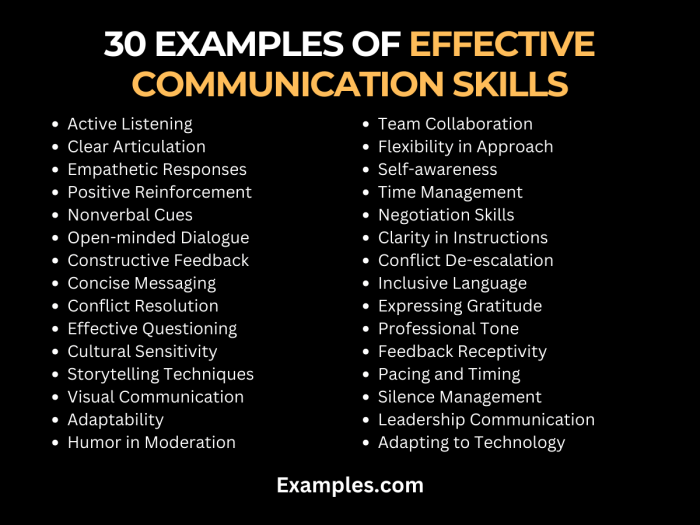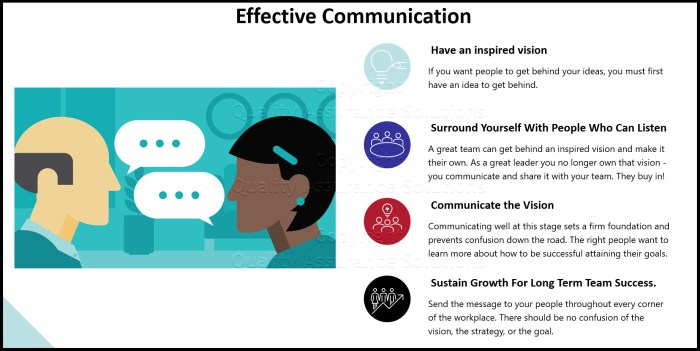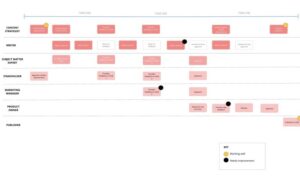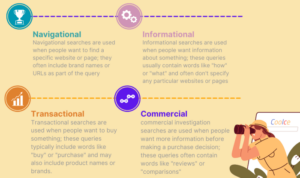Effective Communication Skills: Mastering the Art of Connection dives deep into the realm of communication, exploring how crucial it is in all aspects of life. From personal relationships to professional success, the ability to communicate effectively can truly make a difference. Get ready to uncover the secrets to enhancing your communication skills and revolutionizing your interactions.
In this guide, we will break down the different types of communication skills, strategies for improvement, ways to overcome barriers, and the importance of empathy in fostering meaningful connections. So, buckle up and get ready to level up your communication game!
Importance of Effective Communication Skills

Effective communication skills are essential in both personal and professional settings as they play a crucial role in building relationships, resolving conflicts, and improving productivity. When individuals possess good communication skills, they can convey their thoughts and ideas clearly, leading to better understanding and stronger connections with others.
Enhancing Relationships
Effective communication skills can enhance relationships by fostering trust, empathy, and mutual respect. By actively listening to others, expressing oneself clearly, and being aware of nonverbal cues, individuals can establish meaningful connections and avoid misunderstandings.
Improving Productivity
In professional settings, good communication skills can significantly boost productivity. Clear and concise communication ensures that tasks are understood correctly, deadlines are met, and teamwork is efficient. By communicating effectively with colleagues and superiors, individuals can streamline processes and achieve common goals.
Impact of Poor Communication
On the other hand, poor communication can lead to misunderstandings, conflicts, and even breakdowns in relationships. When messages are unclear, incomplete, or misinterpreted, it can result in frustration, resentment, and a lack of trust. In a professional context, ineffective communication can lead to errors, delays, and decreased morale among team members.
Types of Communication Skills
Effective communication involves various types of skills that play a crucial role in conveying messages clearly and efficiently. These skills include verbal, non-verbal, written, and listening skills, each serving a unique purpose in different contexts.
Verbal Communication Skills
Verbal communication involves the use of spoken words to convey messages. It is essential in face-to-face interactions, presentations, meetings, and phone conversations. The tone, pitch, and clarity of speech can significantly impact the effectiveness of verbal communication. For example, using a confident tone during a presentation can captivate the audience and enhance understanding.
Non-verbal Communication Skills
Non-verbal communication includes body language, facial expressions, gestures, and eye contact. These subtle cues can convey emotions, attitude, and interest without the need for words. In situations where verbal communication may be limited, such as in a noisy environment or with individuals who speak a different language, non-verbal cues play a crucial role in conveying messages effectively.
Written Communication Skills
Written communication involves the use of written words to convey information. This type of communication is prevalent in emails, reports, memos, and letters. Clarity, conciseness, and proper grammar are essential elements of effective written communication. For instance, a well-written email with clear instructions can prevent misunderstandings and facilitate smooth workflow.
Listening Skills
Listening skills are crucial for understanding others’ perspectives, ideas, and feedback. Active listening, which involves fully concentrating on what is being said, is a key component of effective communication. By actively listening to others, individuals can show empathy, build trust, and avoid misinterpretations. For example, paraphrasing what someone has said can demonstrate that you are actively engaged in the conversation and value their input.
Developing Effective Communication Skills

Effective communication skills are essential for success in various aspects of life. Developing these skills involves improving verbal communication, enhancing non-verbal cues, and mastering active listening techniques.
Strategies for Improving Verbal Communication Skills
- Practice clear and concise speech to convey your message effectively.
- Work on your tone of voice to communicate emotions and intentions accurately.
- Use active language and avoid passive phrases to engage listeners.
- Seek feedback from others to identify areas for improvement.
Techniques for Enhancing Non-Verbal Communication Cues
- Pay attention to your body language, such as posture and gestures, to align with your words.
- Maintain eye contact to show interest and build rapport with the speaker.
- Use facial expressions to express emotions and convey your message effectively.
- Be mindful of personal space and respect cultural differences in non-verbal communication.
Tips for Developing Active Listening Skills
- Give your full attention to the speaker without distractions or interruptions.
- Practice reflective listening by paraphrasing what the speaker said to ensure understanding.
- Show empathy and understanding by acknowledging the speaker’s feelings and perspectives.
- Avoid forming responses in your mind while listening, focus on understanding the speaker’s message first.
Overcoming Communication Barriers
Communication barriers can hinder effective exchange of information and ideas, leading to misunderstandings and conflicts. It is crucial to identify these barriers and find ways to overcome them in both personal and professional interactions.
Identifying Common Barriers, Effective Communication Skills
Some common barriers to effective communication include:
- Language barriers
- Cultural differences
- Physical barriers (such as noise or distance)
- Emotional barriers (like stress or lack of trust)
- Perceptual barriers (different perspectives or assumptions)
Ways to Overcome Communication Barriers
To overcome these barriers, individuals can:
- Use simple and clear language
- Be mindful of cultural nuances and adapt communication style accordingly
- Eliminate distractions and find a conducive environment for communication
- Show empathy and actively listen to understand others’ emotions
- Seek clarification and feedback to ensure mutual understanding
Examples of Effective Communication in Overcoming Barriers
For instance, in a multicultural team, effective communication skills can help bridge language and cultural gaps, fostering collaboration and synergy. By actively listening and acknowledging diverse perspectives, individuals can overcome perceptual barriers and build strong relationships based on trust and respect.
Importance of Empathy in Communication: Effective Communication Skills
Empathy plays a crucial role in fostering effective communication by allowing individuals to understand and connect with others on a deeper level.
Enhancing Understanding and Connection
Empathy can enhance understanding and connection in conversations by putting oneself in the other person’s shoes and seeing things from their perspective. This helps in building trust and rapport, making the communication more effective.
- Empathy allows individuals to listen actively and acknowledge the emotions and feelings of others, leading to better comprehension of their message.
- By showing empathy, people feel heard and valued, creating a positive environment for open and honest communication.
- Empathy helps in resolving conflicts peacefully by showing understanding and compassion towards the other person’s point of view.
Improving Communication Outcomes
Practicing empathy can significantly improve communication outcomes by creating a supportive and respectful interaction between individuals.
- Empathy helps in building stronger relationships based on trust and mutual understanding, leading to more effective collaboration and teamwork.
- By empathizing with others, individuals can tailor their communication style to suit the needs and preferences of the other person, ensuring clear and effective exchange of information.
- Empathy fosters a sense of connection and belonging, making people feel valued and respected, resulting in better overall communication outcomes.





